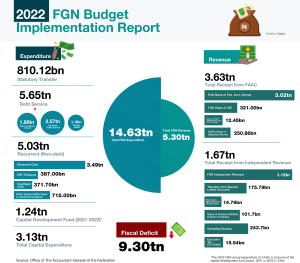Abuja, Nigeria – 16/11/2023

In a startling revelation, the Federal Government of Nigeria has allocated a staggering 106.8% of its 2022 revenue to debt servicing, according to the recently released 2022 FGN Budget Implementation Report. SkyDNews delves into the intricacies of the report to provide a comprehensive understanding of the financial developments that unfolded during the fiscal year.
Revenue Generation: In 2022, the Federal Government of Nigeria reported a total revenue of N5.30 trillion. This sum included N3.63 trillion sourced from the Federation Account Allocation Committee (FAAC) and N1.67 trillion generated independently. These figures offer a glimpse into the income streams available to the government throughout the fiscal year.
Debt Servicing: The most striking revelation emerges in the realm of debt servicing. The government disbursed a substantial 106.8% of its total revenue, equivalent to N5.65 trillion, to meet its debt obligations. This implies that not only did the government utilize its entire generated revenue, but it also tapped into other resources to fulfill its debt servicing commitments. This raises pressing concerns about the sustainability of the current fiscal strategy and questions the government's efficacy in managing its debt.
Total Expenditure and Deficit: The Federal Government's overall expenditure for the year reached a significant N14.63 trillion, resulting in a staggering deficit of N9.30 trillion. This deficit underscores a substantial financial gap that needs urgent attention, indicating that the government is spending considerably more than it is earning.
Breakdown of Expenditure: Non-debt Recurrent Expenditure: This category accounted for N5.03 trillion, with personnel costs leading at N3.49 trillion. Other significant expenses included Other Service-wide Votes at N715 billion, CRF pensions at N387 billion, and Overhead costs at N371 billion.
Debt Service (Ways & Means Interest, Domestic & Foreign): A substantial portion of the expenditure, N5.65 trillion, was allocated to servicing debts. This includes payments on Ways & Means Interest, along with servicing both domestic and foreign debts.
Statutory Transfers: N810.12 billion was earmarked for Statutory Transfers, representing obligatory fund transfers to specific government agencies and bodies.
Capital Projects: Despite the considerable emphasis on debt servicing and recurrent expenditure, capital projects, encompassing infrastructure, economic development, and other long-term investments, received N3.13 trillion. It's crucial to note that this figure excludes the N1.24 trillion rolled over from the previous year, highlighting the commitment to on-going and new capital initiatives.
Conclusion: The Federal Government's fiscal management in 2022 poses critical questions regarding the sustainability of its debt servicing strategy and necessitates a re-evaluation of its expenditure approach. The prioritization of debt servicing over essential areas such as capital projects and non-debt recurrent expenditure underscores the challenges the government faces in maintaining a stable financial framework. Addressing these issues will be imperative for ensuring the long-term economic health and stability of Nigeria.
SkyDNews will continue to closely monitor these developments and provide updates on the evolving financial landscape of the Federal Government of Nigeria.


